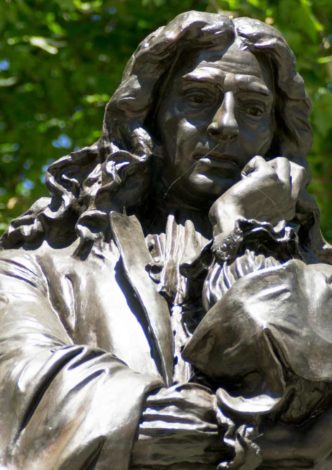The 15th February 1971 was United Kingdom Decimalisation Day: no longer were there 12 pennies to a shilling, half-crowns, or 240 pennies to the pound. That day, 50 years ago, was also just over half-way through the greatest strike this country had seen since the General Strike of 1926: the 44-day national strike of 200,000 Post Office workers. Telegraphists, telephonists, Post Office counter clerks, cleaners, postmen (170,000 of them!) and PHGs (Postmen Higher Grade), members of the Union of […]
During 2010, and during Black History Month no less, a plaque was quietly erected in the rural town of Brecon, Wales to commemorate the life of a slave trader and commander of the slave ship Hannibal without public consultation. African people were purchased by agents of The Royal African Company to undertake forced labour and childbearing as slaves for the accumulation of profit. In 1693 700 enslaved African women, men and children were forced below the decks of the Hannibal under the command […]
This story starts in the Forest of Dean with a riot and song and ends with an account of the struggle for the human rights of the visually impaired in Australia. The folk song As Sylvie Was Walking, made famous by Pentangle in 1969, has been traced to Ann Howell who was born in October 1832 at Broadwell Lane End, Forest of Dean, where she learnt it from her uncle. The Pentangle version, which can be viewed on YouTube, is called Once I had a Sweetheart and leaves out the first three verses. The […]
I came to Bristol from Newport in South Wales in August 1962 when I was 12 years old. I had been brought up there and my family came from the Pontypool area. I had once been to Bristol Zoo on a school trip and spent a family holiday in a small caravan at Portishead, both times coming by trail under the Severn. I had also been on a school day trip by steamer from Cardiff Docks to Weston-super-mare when I was about 10. My family moved to Bristol because he had become a Methodist minister, getting […]
Recent years have seen the growth of sub-contracting, piece work, self-employment, daywork, zero-hour contracts, minimum wages and the use of agencies in the never-ending attempt by capital to reduce the cost of labour. This is an account of the use of sub-contracting in the mining industry in the Forest of Dean 1922 – 1938. It examines the impacts of the system on workforce cohesion and solidarity as well as the extent to which it succeeded in increasing the rate of exploitation of the […]
A silent clause When Edward Colston died in 1721 we can be fairly certain that before long his body had disintegrated into dust. To talk of Colston, therefore, is meaningless unless we recognise that our knowledge of that long dead figure will always be dependant upon how we read, interpret and understand the historical record which is made up of histories, biographies, memoirs, documents, images, statues and artefacts. And because most of the historical record was created, constructed, produced […]
The phrase “the moral economy” was first used by E. P. Thompson, within the essay of the same name. He explained it as was part of a long change in economic and community relations. As Britain industrialised at speed, there was a change from a paternalistic rural economy, to a free market guided by the ideology of Adam Smith. The moral economy related to part of the resistance from the labouring poor during these economic and social upheavals. This was community based, with a crowd of people […]
Usage license Introduction Based upon recent research by academic researchers and local historians, this page contains materials made available under a Creative Commons license (CC-BY-NC-SA 4.0) for primary and secondary schools and colleges. They are intended to be relevant to a range of subjects (in particular, history, religious education, citizenship, the humanities more generally and may provide the basis of project work). The material will be added to as the project evolves. To find out […]
The Second World War in Europe is often presented as a war against fascism though this is conflated with a war against the nations of Germany and Italy and by default with Germans and Italians. The VE day celebrations today will be presented as those of a nation united against the Nazis. However, numerous anti-fascist Germans or Italians were interned in poor conditions in the UK whilst the British fascist leader Oswald Mosley, although interned, was better treated and released early. Upon the […]
I have been interested, for some time now, in the writings of John Addington Symonds (1840-1893) mainly because of my researches into the legal censoring and subsequent bibliographical history of Volumes 1 and 2 of Havelock Ellis’s six volume Studies in the Psychology of Sex [Studies]. Symonds collaborated with Ellis on Sexual Inversion (homosexuality), which was originally Volume 1 of Studies and that volume is now considered an important if not foundational text in the early history of […]










